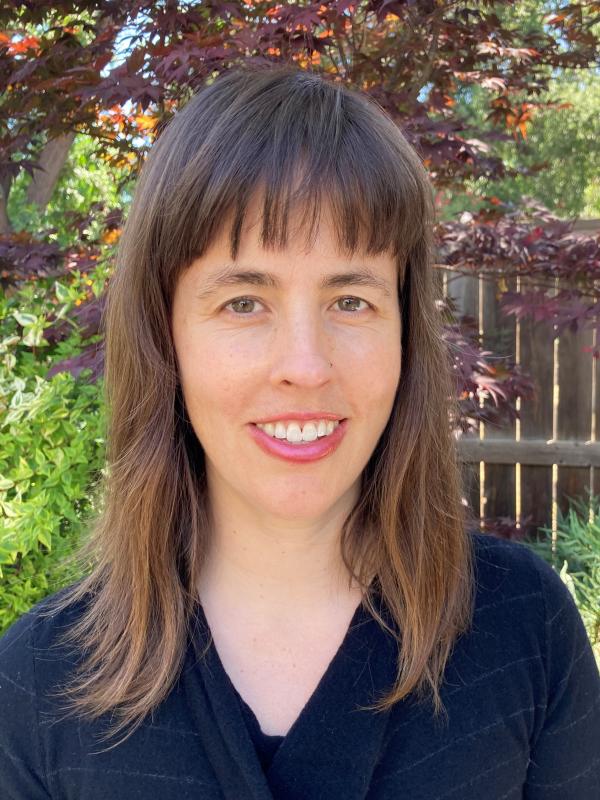Juliet Sims

Juliet Sims, Director
Email: Juliet_at_preventioninstitute_dot_org
“At Prevention Institute, we bring a vision, a grounding in evidence, and a broader perspective about prevention that provides a really strong foundation for policy development. We’ve evolved to a place where we aren’t just looking at single issues but looking at the intersections across multiple systems and sectors and articulating solutions that prevent illness and injury and how we can design those systems intentionally to advance health equity.”
Juliet Sims is a director at Prevention Institute, where she supports projects related to healthy eating and active living, with an emphasis on local, state, and federal initiatives that increase access to nutritious food and limit harmful marketing practices. “When I studied nutrition as an undergrad, I was often the one asking: “Kids can buy 20-ounce sodas at school. Why aren’t we looking at that?” I think I was looking at policy issues even before I fully understood what I was doing. My program was quite focused on clinical nutrition, so when I graduated, I decided to go work in a hospital and go see what it was all about.”
Juliet’s experience in the hospital system reinforced her belief in the value of primary prevention and the need to shift policy, rather than focus on individual behavior change alone. “I was struck by how almost tangential nutrition felt… I was working with people living in poverty, experiencing community- and individual-level trauma, who couldn’t even access the food I was advising them to eat. They were already at a point where the cumulative effects of those conditions were affecting their health. We’d already lost ground in terms of primary prevention.”
In 2007, Juliet joined Prevention Institute: “I was like a sponge for the first few years. I felt like there was a place for me. It leveraged my skills and I was able to acknowledge health inequities in the process. I really struggled with that in the healthcare system, working to treat the effects of inequities, without getting to the root causes. I felt so good about finding an approach that acknowledged the complexity of health and the value of moving upstream.”
In her current position, Juliet directs the organization’s efforts to embed community-level prevention approaches within California state policy with the goal of advancing health, safety, and equity. In 2014, Juliet was the lead author of the policy platform, A Healthy Future for California, endorsed by over 40 state and local organizations, which was shared with state legislators and administrators. She has also provided guidance on development of food and nutrition standards in state and local policy, including a model ordinance setting nutrition standards for kids’ meals sold with an incentive item, and state and local food procurement and vending policy.
Juliet collaborates closely with state and county health departments, community-based organizations, and foundations to provide consultation, strategic planning, and training on primary prevention, particularly in the areas of nutrition and physical activity. “I’ve really focused on cultivating relationships with like-minded state and local organizations that strongly value prevention and equity. Because we work in partnership with community organizations at the local level, we’ve been able to learn from communities’ experiences, priorities, and successes, and bring that to our statewide approach.”
Juliet has served as a technical assistance provider for the Centers for Disease Control and Prevention’s Communities Putting Prevention to Work (CPPW) and Community Transformation Grants (CTG) initiatives, providing one-on-one support to grantees and their community partners in their efforts to reduce chronic disease related to nutrition, activity, and tobacco, using evidence- and practice-based strategies that emphasize change at a policy, systemic, and environmental level. She led the development of the Sacramento County Prevention Policy Scan on behalf of Sierra Health Foundation, a CTG capacity-building awardee. The resulting scan assessed the region’s local policy and organizational practice change initiatives and identified strategic opportunities for future community prevention efforts. Building on this work, Juliet supported the strategic development of the Foundation’s three-year Community Transformation Implementation Plan.
Juliet is a registered dietitian and received her MPH with a focus on nutrition from the University of California, Berkeley. Her recent publications include: A System of Prevention: Achieving Health and Wellbeing for All. Prevention Institute, 2018; Partnering for Health Equity: Grassroots Organizations on Collaborating with Public Health Agencies. Prevention Institute, 2018; Maintaining Our Gains, Leading Towards the Future. Prevention Institute, 2017; Partnerships to Create a Healthy, Local, and Sustainable Food System in Los Angeles County. County of Los Angeles Public Health, Division of Chronic Disease & Injury Prevention, 2016; The Path to Healthy Vending in Los Angeles County. County of Los Angeles Public Health, Division of Chronic Disease & Injury Prevention, 2016; A Healthy Future for California. Strategic Alliance, 2014; and as a contributing author to the CDC’s A Practitioner’s Guide for Advancing Health Equity: Community Strategies for Preventing Chronic Disease. Atlanta, GA: US Department of Health and Human Services; 2013.
Juliet is a regular presenter at conferences on nutrition, diet-related chronic disease, advancing health equity, and media advocacy. She has served on a number of public health committees, including as a member of a steering committee convened on the White Paper on Strategies to Reduce Unhealthy Food and Beverage Marketing to Young Children, Expert Panel on Cross-Pollinating Lessons Learned in Tobacco Control and Obesity Prevention to Impact Low SES Communities, and the 8th Biennial Childhood Obesity Conference Planning Committee and Marketing Track Leader, 2014-15. In 2017, she was appointed to the advisory group for the American Cancer Society Action Network.






